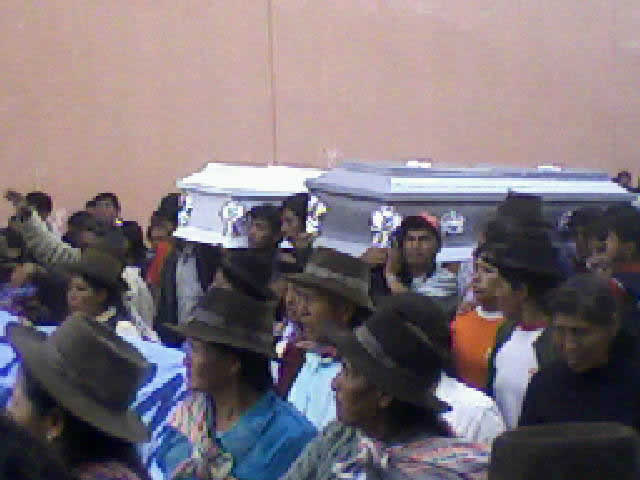
|
The 700 farmers now face four years in jail. Barack Obama continues to laud the Peru deal as a model trade agreement because of its meager window dressing of environmental and labor reforms.
The Humane Society of the United States, which claims to oppose factory farming, testified before Congress in support of the Agreement’s environmental provisions, despite opposition to the agreement by EVERY OTHER animal group that took a position—and support for the agreement by groups like the American Meat Institute, the National Cattlemen’s Beef Association, and the National Pork Producers Council They’ve had nothing to say about the farmers dying in the streets to stop US factory farm agriculture from obliterating Peru’s family farms.
WHAT YOU CAN DO
- Contact Elliot Engel, Chair of the House Western Hemisphere Subcommittee and demand an investigation into the jailings and killings in Peru. Phone (202) 225-2464,
Fax: (202) 225-5513 or email
- Call your Senators and Representatives and urge them to support Fair Trade for All Act of 2007, which would repeal the Peru Free Trade Agreement. Tell them that the killings Peru demonstrate that groups like the Washington Office on Latin America were correct in predicting that that passage of the Peru Free Trade Agreement would lead to violence and instability and that the only way to prevent further violence is the withdraw from the Agreement. You can find out who represents you and their contact info here.
- Write to the Humane Society of the United States and remind them that by supporting the Peru Free Trade Agreement despite warnings that it would destroy the livelihoods of farmers and contribute to violence and instability in the region, the needless deaths of these farmers is on their hands. Urge them to reverse their position of support for the Panama Free Trade Agreement and to oppose the Colombia and South Korea Free Trade Agreements.
Write to these Humane Society Officials:
Wayne Pacelle
Andrew Rowan, Ph.D.
Patricia Forkan |
 |
Global Justice for Animals and the Environment is a project of: Wetlands Activism Collective Phone: (718) 218-4523 Fax: (501) 633-34761 activism @ wetlands-preserve.org |
 Throughout the battle over the Peru Free Trade Agreement, Global Justice for Animals and the Environment warned that passage of the agreement would lead to a shift towards consumption of foods from inhumane, polluting factory farms and pesticide and petroleum dependent industrial crop growing as US exports gain duty-free access to the Peruvian market.
Throughout the battle over the Peru Free Trade Agreement, Global Justice for Animals and the Environment warned that passage of the agreement would lead to a shift towards consumption of foods from inhumane, polluting factory farms and pesticide and petroleum dependent industrial crop growing as US exports gain duty-free access to the Peruvian market.
 As we’ve seen under NAFTA and CAFTA, when US exports gain duty free access, family farmers practicing more sustainable traditional agricultural methods are driven out of business and off their land. Fearing this would happen to them, Peruvian farmers engaged in a national agricultural strike and nonviolently blockading major roads in late February.
As we’ve seen under NAFTA and CAFTA, when US exports gain duty free access, family farmers practicing more sustainable traditional agricultural methods are driven out of business and off their land. Fearing this would happen to them, Peruvian farmers engaged in a national agricultural strike and nonviolently blockading major roads in late February.
 Peruvian President Alan Garcia responded by declaring a state of emergency and authorizing military rule in 8 Peruvian regions. 700 farmers were jailed and three were killed as a result – one died fleeing police gas attacks and two were shot in the head by police. A fourth farmer was killed by an angry motorist at a road blockade.
Peruvian President Alan Garcia responded by declaring a state of emergency and authorizing military rule in 8 Peruvian regions. 700 farmers were jailed and three were killed as a result – one died fleeing police gas attacks and two were shot in the head by police. A fourth farmer was killed by an angry motorist at a road blockade.